Wrath Of The Titans Star Toby Kebbell Talks Big Monsters, Digital Effects And Green Wood
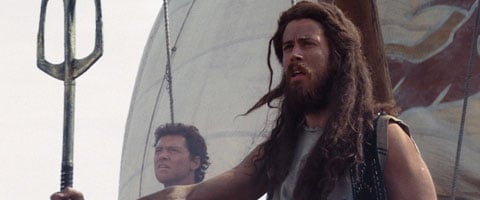
We’ve still got massive monsters, powerful gods and a ton of epic battles, but director Jonathan Liebesman and company are making big changes with their Clash of the Titans sequel, Wrath of the Titans, and one major step in the right direction is the inclusion of some comedic relief courtesy of Toby Kebbell.
Kebbell steps in as Agenor, the forgotten son of Poseidon and, therefore, Perseus’ (Sam Worthington) cousin. When the mortals stop praying to the gods, they lose their powers, leaving them helpless against the Titans. Now the safety of the world lies in Perseus’ hands, but in order to find the location at which he must start his journey, he needs the self-proclaimed Navigator, Agenor. Along with Queen Andromeda (Rosamund Pike), they trek through Cyclopes territory and on in an effort to find a way to keep the Titans and Kronos from ravaging the earth.
Sure starring in a major motion picture sounds glamorous, but in Kebbell’s case it involved being covered in mud, wearing tiny costumes in cold weather, having to hit marks perfectly for the sake of visual effects and more. However, as a guy who prefers to be on set even when he’s not called, making Wrath of the Titans was a pleasure for the actor. Read all about his experience in the interview below.
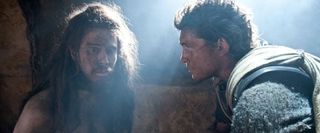
You get a role in this glamorous multi-million dollar studio movie and then you walk around incredibly dirty the entire time. I really didn’t think your character could get much dirtier than when we first meet him, but then he does.
Toby Kebbell: [Laughs] Stays dirty and gets bloodier, yeah.
How was that? Are you literally just rolling in mud with your makeup team?
I wish it was as sweet as that. Unfortunately, what it is is they paint you every morning with a cold sponge. And you’re wearing a skirt so it goes right up to your underpant line. So, yes, I had to be very sweet to my very sweet young makeup girl because there were some mornings when I didn’t ever want to see that sponge again, especially in the Welsh Mountains when it’s ice cold already and I was covered in mud.
CINEMABLEND NEWSLETTER
Your Daily Blend of Entertainment News
It was cold when you were shooting this?
In Wales, yeah. In the Welsh Mountains I’d say it was maybe 4 degrees, the wind chill makes it feel about zero, centigrade that is. It was freezing. If you watch the film closely, you’ll see all the stuntmen are wearing big robes, all my soldiers, my troops in the final battle. I, however, am shirtless with underpants and a scarf covered in mud.
That’s what you get for getting a leading role in a swords and sandals movie.
That’s exactly it! The glamour disappeared very quick.
So what’s your preparation process when you get a new role? Over the years have you established any sort of routine?
Always my routine, whether it be a play or a TV episode or a helping young kids audition for a workshop, is you gotta take that piece out of yourself so that you’re not thinking about it, you’re not trying to perform. What always agitates me is when you’re watching actors perform and that’s perhaps because I’m not an artist. I don’t come from that artistic place, but I believe in pretend. I totally understand what Sir Laurence Olivier was talking about. I also feel like I understand what Daniel Day Lewis and all the method chaps are talking about, but I really feel like that has to come from within yourself. It’s like writing. It’s like write what you know. That’s why there’s a ton of characters I’ll turn down because I’m like, I have no clue about this. I’ve either not matured to this level or I’ve never experienced this or I’ve just got no interest in playing this very dull moment in human development. So yeah, to stop being an arty farty brat, [laughs] I accentuated my already fevered ego to play the demigod side and tried to add a nuance to it. The reason he’s cocky and arrogant and blasé is because he’s scared and disappointed. It gives me a journey to go on a little bit.
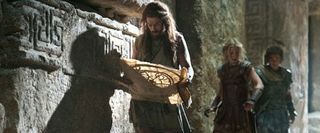
This went into pre-production in January of 2011 and then started shooting only two months later. Did you feel the effects of that at all?
I like to work that way. Very quickly, when I sat with Jonathan, I realized that all of the Greek mythology I read wasn’t 100% relevant. It did give me a couple of bits of backstory so when I’m trying to argue my point I had the beauty of Greek mythology to back me up and go, ‘Well, actually, in Greek mythology.’ But Liebo’s brilliant. He just sort of cut me down a little bit and said, ‘Just please help me make a good film. That’s all I want you for.’ [Laughs] I had a great friendship with him and with Sam, and we worked very hard to sort of alleviate the pressure of what was on the page in a sort of clichéd expositional process, well written, by the way, into something that we enjoyed to do and something that we felt was more character based.
And then how about the filming process? That was a bit of the opposite. It lasted four whole months. Were you on set that entire time?
I was there everyday. We took Sundays off, but we did a lot of six-day weeks and that’s 14 hours a day. But I enjoy it. I actually enjoy it. I’m terrible; I had one day off yesterday and I didn’t know what on earth to do at all. As soon as my friend turned up I was like, ‘Let’s sit and chat!’ I’m terrible on my own. [Laughs] I think I have a perpetual hatred of feared loneliness. But I enjoy it; I really love being there and even when I’m not shooting, I stay on set. So if it’s not my scene or it’s not my thing, I just like to stay around because I like to be there. And I feel like I’m lucky to be there. What was the question? What am I not answering? [Laughs] I’m just blathering on!
[Laughs] The long production process.
Yes, I was there the whole time and that’s actually useful because then it really gives you that amount of time to ponder on the decisions you’ve made that you think are brilliant in the morning and then you’re like, ‘Fuck, does that even work? Does that even figure out? Yeah, that figures out!’ Or, ‘No, shit. That doesn’t figure out. Maybe we should do this as well.’ So yeah, I was just very lucky to have such a nice team of Jonathan and Sam, working together with them. Yeah, we shouted, but we’re all chaps and I think luckily we had the delicate nature of Rosamund and when she didn’t feel like being there, I think she hid in her tent. [Laughs] So it was nice, but yeah, I think we all enjoyed to shout at each other in our dresses.
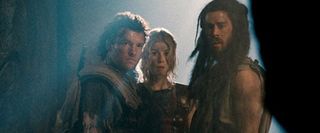
How about the environment on set in terms of what you saw? Of course there are a ton of digital effects, but I imagine a lot had to be there in the flesh, too.
Yeah, there is a lot of practical stuff. In the underworld, the labyrinth, they were all practical sets, moving sets. They’ll be added to, definitely, to give them the scope and the scale, but they were moving sets and they moved at pace. The crew we had, the special effects crew, is incredible. Not only were you working for Jonathan to make a great film, he gently made it clear that we’re trying to do this for the VFX guys, so yes, you are holding a piece of green wood in your hand, not the American terminology. [Laughs]
[Laughs] Good thing you clarified that.
Yeah, there wasn’t a troll on set. [Laughs] I wasn’t holding his wood. There was holding a piece of green wood in your hand, but, you know, you’re doing this for the VFX boys and I think having watched and loved Jim Carrey’s films, you realize how important it is to just go wild and let yourself loose in that moment because then the VFX boys can make it cool and look really powerful, but if you sort of go, [grunts and mimics stinted fighting movements], then it’s like, what can I do with that? You have to engage your fevered ego for one side of your character and let it go in order to pretend the green stick’s real.
And how much of this stuff are you really doing? I’m thinking of that cage scene and it gets pulled up into the trees pretty damn fast. Are you actually in there?
Yeah! And hopefully they’ll have on the DVD some of the extras that show you me in that cage. I did all of my stunts and in fact my stuntman was like, ‘It’s perfect for me, bro, because you’re doing really well.’ I was like, ‘Thanks man. That’s really kind.’ He’s like, ‘No, no, I can put them on my show reel because no one will be able to tell it’s you!’ Especially in Wales when my head’s all scarfed up and I’m running up that post to swipe. Let me tell you, there are 11 stunts going off just before, so boom, I run out of the hole, I run back, I’m watching one, two three, four, five, stick up, run up the stick and then swipe and I had to get that sword – the shot is from here, so I run up that spike and I have to swipe, remembering I’m jumping off and there’s a trench right in front of it, and I have to swipe. [Laughs] What really caught my aggression was when the dude was like, ‘Yeah, but you’re like three inches off swiping his neck.’ I was like, ‘Why don’t you do it?’ And I was like, ‘I want to do this, so why am I being such a baby about it?’ But yeah, it was tricky.
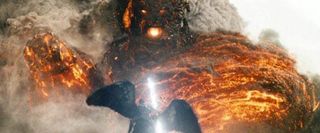
Is that how all of these big battle sequences are shot? Are there a million things going on at one or is it tiny pieces at a time?
No, because everyone’s realized from HD and from fantastic directors like Steven Spielberg, if there’s nothing going on in the background and you have to VFX that later on, people are like, ‘Uh, there’s all those things just moving unlike human beings.’ You can try as much as you like, but the way people flip is so unique. They’re like snowflakes, magically, so you have to fill up the scope of the background and unfortunately when you’ve decided to do that shot of me running up the post, you’ve got the whole battlefield.
How’d the 3D come into play? Did that affect your work at all?
No, not at all. The 3D is just the same as the visual effects. But I know everyone was really excited about the 3D on this. They had it just right. They were figuring it out so every now and again you had to move your body incorrectly, if you like. But, no, basically, it was exactly the same. You have to sell it as much as you possibly can in that moment so that they’ve got something to do with it. And that’s why the sword had to go exactly where it had to go.
What happens from here? Assuming all goes to plan, you’ll be making a third one.
Yeah, that would be – but it’s someone else’s plan. I have zero plans unfortunately. I’m a solider, so I have to – I’m not a solider, but you know what I mean in the sense of that I’m a troop and I sit around waiting until I’m told where to go. I would love to do a third one.
Staff Writer for CinemaBlend.
Most Popular





